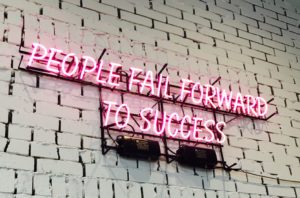1. Consistent effort day in day out
Peak performance doesn’t happen instantly or naturally. To achieve optimal performance you need to put in the effort over an extended period of time.
Research shows that many top athletes will start their next phase of training immediately after their major games are played. They use the off season to get a head start for the next season. They understand that being consistent and disciplined helps form good habits which pay off eventually and build your underlying work ethic.
2. Set goals and targets

Top performers set goals across multiple time horizons. Every year, they will take time to reflect and then plan their goals for the year, which they will then break down to a micro level to work out how to achieve them. This is because top performers understand that a big annual or long term goal can be overwhelming. It can even be hard to visualise achieving it if you don’t plan how to get there.
For example, the goal of being promoted to a manager in 12 months can seem very challenging and beyond your ability to make happen. However if you set monthly targets to help you, such as set up a one on one meeting with your manager in January to go through your areas of development, take on additional responsibilities in March, review whether you are on track in June, mentor a junior in September, you can be well on your way to accomplishing this goal by the end of the year.
3. Don’t be afraid to fail

A top performer is not afraid to fail. They see every failure as a critical learning experience and despite their past achievements, they are not afraid of trying new things and will potentially fail again and again.
The top performers in the office are your colleagues who put their hand up for a difficult project and then follow through. They will also encourage other team members to constantly improve and look for ways to improve the company’s performance often through incremental small changes.
They are not attached to their past achievements and don’t use their past success as validation of how good they are. Instead, they seek new challenges different ways to learn.
4. Get into a state of ‘flow’ when you work
A state of ‘flow’ happens when you are so immersed in a task, your mind is in sync with the task you are performing and it all feels easy and natural. When you are in a state of flow, your mental state shifts into a new space, time is not relevant and all your energy is channelled into the task at hand. This can be extremely productive for your work performance and you will also feel great once you have completed the task.
In order to get into this ‘flow’, you will need to be completely absorbed into the task you are doing. That means no distractions from the outside and having the utmost focus and concentration. You can practice this by becoming more self aware and recognising any tendencies to be distracted and then gently pulling yourself back to the task at hand. There are many distractions in the work place and it can be useful to look for ways to reduce these eg allocating times to focus on responding to emails and then choosing not to look at emails while you are working on a particular project.
If you can achieve this flow state often, it can become very powerful as it makes you much more productive and satisfied with the work that you do.
5. Make health and fitness a priority

Any job can be demanding. You may be required to work long hours and even on weekends. During those busy periods, it is easy to put gym and healthy dinners on the backbench as you knuckle down to get tight deadlines met and delivered.
Top performers still maintain their important routines despite their busy schedules. By scheduling these in they will find they are more productive during the day. Do you have to have lunch with your friend today, or can you postpone it until that report is due? Too busy to make the gym today? You can get up earlier to hit the gym and then focus on your deadline for the rest of the day or a break from the work might make you feel better and more focussed so meeting the deadline becomes easier.
The healthier you feel, the more productive and focussed you will be. Top performers know this which is why they don’t compromise on their fitness regime.
The key learning from these tips is the importance of planning and reflection. Top performers think about what they want to achieve, how they will do it and how to stay healthy enough to be able to deliver.










